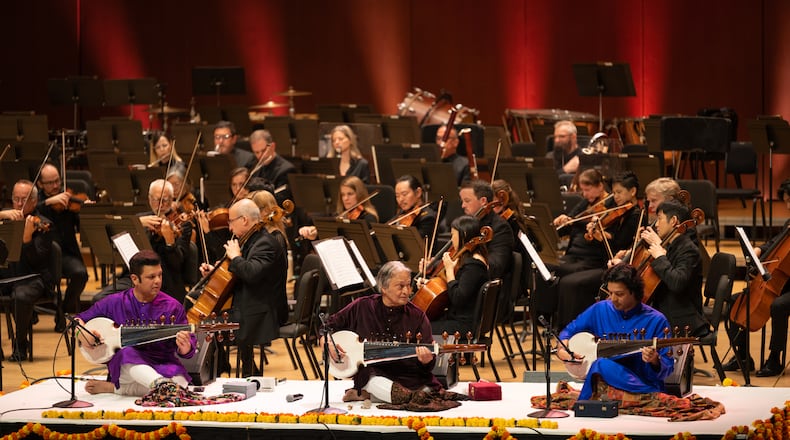Amjad Ali Khan, a virtuoso on the lute-like sarod, started his first American tour in the mid-1960s. From the age of 6, he had performed in his native India, and teenage Khan was ready to bring the 25-string cousin of the sitar to new audiences. That maiden voyage to the U.S. may have been his first attempt to unite musical cultures.
On Thursday at Symphony Hall, Khan, now in his late 70s, and his two sons, Amaan and Ayaan, brought their sarods for a performance that melded European and Indian classical musical histories. Amaan and Ayann represent the seventh generation of sarod players in the family; Khan’s 18th-century ancestor is credited in some places with the invention of the instrument to which they have dedicated their lives.
Under the baton of guest conductor Lidiya Yankovskaya, Khan’s through-composed “Samaagam” proved an apt study in bridging the gap between cultures. Written in 2008, Khan has given performances of the piece as both a soloist and with his sons, the three of them trading off improvisations on the Indian ragas that form the foundation of the work. In 2011 Khan and the Scottish Chamber Orchestra released an enchanting, expertly crafted recording of the concerto.
Credit: Rand Lines
Credit: Rand Lines
Thursday, there were numerous instances of passionate orchestral playing melding with the three improvising sarod players and percussionist Shane Shanahan, who performed on three Indian classical drums: darbuka, frame drum and kanjira. (On the recording, and in some performances, a tabla player accompanies the music.) These moments were the exception to the rule for an orchestra that at times struggled with expanding their ensemble playing into a new context.
The Khans sounded masterful. For them, notes are not concrete; pitches are approached through bends, slides and other ornamentation, providing elasticity to sarod improvisations. Unlike guitar, on which notes are played with fingertips, sarod players use the edge of their nails, allowing for lengthy, frequent glissandos. This liquid relationship to pitch gave even more weight to their single-note melodic bursts, picked with a bracing attack. These improvisations fit into a groove perpetuated by Shanahan’s drums. That feeling did not permeate the collective, and the “behind the beat” sarod playing did not blend well with a seemingly inflexible orchestra.
The concert began with American Gabriela Lena Frank’s tone poem “Elegia Andina,” first performed by the ASO in 2021. Music rose out of a mist of strings with a slinky, scalar ascending melody in the woodwinds crashing down in orchestral discord before resolving into sunny harmony. Frank’s piece is full of contradiction, of light and dark hues all ajumble. Later, a driving pulse emerged from the low strings, the crisp, articulated sound contrasting a discordant trumpet choir playing an off-kilter heraldic melody. The orchestra played deftly and attentively under Yankovskaya. She conducted with a broad but clear beat, shaping phrases with practiced swoops of her arms and quick zips of her baton.
After intermission, the ASO returned to their comfort zone with selections from Prokofiev’s “Romeo and Juliet.” Atlanta audiences last heard the work in an ASO subscription concert led by former music director Robert Spano; there was unfamiliar music on the program that night too: Krists Auznieks’ “Crossing.” Following up a challenge with a chestnut is Programming 101. That night, “Romeo and Juliet” sung, led by the lush string section. Prokofiev is Yankovskaya’s wheelhouse, as are Slavic masterpieces more generally. The ASO sounded entrancing Thursday, playing music that bordered on being emotionally overwhelming, a credit to the conductor’s reading of the ballet. From the thundering triple-forte chords that open “The Montagues and the Capulets” and that movement’s yo-yoing string melody to the scalding strings and woodwind filigree in “Cortege with Tybalt’s Body,” the ASO sounded in top form.
Before he began, Khan explained that the tile of his work means to come together. With that, he dedicated the concert to world peace. Inventive programming should be encouraged, and I suspect with a little more rehearsal “Samaagam” would have united the musicians as brilliantly as the more familiar Prokofiev.
CONCERT REVIEW
Atlanta Symphony Orchestra with Amjad Ali Khan
Additional performance at 8 p.m. Oct. 21. $56-$127. Symphony Hall, 1280 Peachtree St. NE, Atlanta. 404-733-5000, atlantasymphony.org.
About the Author
Keep Reading
The Latest
Featured




